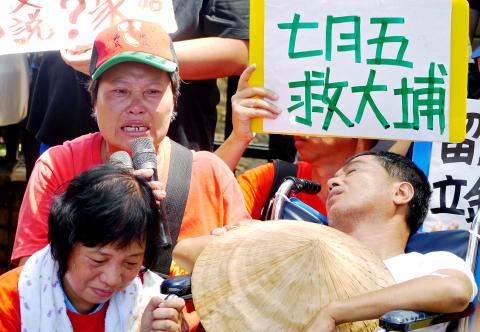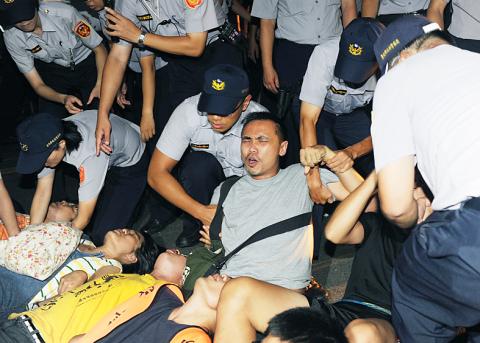|
Dapu protesters,
police clash, as Wu calls a halt
MISCOMMUNICATION? Miaoli’s county commissioner
said the deadline set for today was not for demolition of the houses, but for
the four households to relocate
By Loa Iok-sin / Staff reporter

Residents of Dapu in Miaoli
County’s Jhunan Township hold a press conference in front of the Executive Yuan
in Taipei yesterday in an 11th-hour effort to save their houses from being
demolished by the county government. Chang Sen-wen, right, who had been
hospitalized earlier yesterday morning, was unconscious.
Photo: J. Michael Cole, Taipei Times

Members of Taipei City’s
Department of Police forcefully evict a group of sit-in protesters in front of
the Executive Yuan early yesterday morning.
Photo: Lo Pei-der, Taipei Times
Frustrated at a lack of response from
Premier Jiang Yi-huah (江宜樺) over the impending demolition of the homes of four
families in Dapu (大埔) in Miaoli County’s Jhunan Township (竹南), dozens of
demonstrators yesterday climbed over the gates of the Executive Yuan in Taipei
and clashed with police.
Meanwhile, the Presidential Office said later yesterday that Vice President Wu
Den-yih (吳敦義) had asked the Miaoli County Government to suspend the planned
demolition.
“If the premier is not coming out to see us, we are going in to see him,” Taiwan
Rural Front spokeswoman Frida Tsai (蔡培慧) told the crowd, many of whom had been
protesting outside the Executive Yuan for two days, as Jiang presided over a
Cabinet meeting inside.
As Tsai led the crowd toward the front gate of the Executive Yuan while chanting
“Keep your word, save the houses,” dozens of younger protesters quickly pulled
out blankets, put them over the fence and climbed over into the Executive Yuan.
Several police officers rushed over to prevent the protesters from going into
the Executive Yuan building, while demonstrators on the other side of the fence
clashed with officers guarding the front gate.
Emotions were already running high prior to the clashes, especially after Chang
Sen-wen (張森文), one of the Dapu residents whose house was scheduled for
demolition by the Miaoli County Government any time after today, arrived in a
wheelchair.
Chang lost consciousness early yesterday morning when he was removed by force by
the police after two days of camp-in protest in front of the Executive Yuan. He
fell unconscious and was still unconscious when he appeared at the demonstration
at about 10:30am.
“I insisted on bringing him here, because this may be the last thing he can do
for our home before it’s torn down,” Peng Hsiu-chun (彭秀春), Chang’s wife, said in
tears. “Please save our home, please save my husband.”
Equally emotional was Chu Ping-kun (朱炳坤), another Dapu resident whose house is
also to be demolished.
“My mother committed suicide two years ago because she was so worried about her
home and land being taken over by the government. Despite promises by government
officials, nothing seems to have changed,” Chu said.
“Seeing what’s happening now to Chang is like seeing what happened to my mother:
My mother killed herself, but Chang could be forced into death by the
government,” Chu said.
In tears and hardly able to talk, farmer Hung Hsiang (洪箱), from the neighboring
township of Houlong (後龍), pleaded for help from the premier.
“I feel sad because I can’t do anything to help when a human life is
disappearing in front of me,” Hung said. “A decision that you [the premier] make
could save or kill a person. He [Chang] may survive today, but he would
eventually die when his house is torn down. Why won’t you help save a life?”
Chang’s condition improved later yesterday afternoon and he returned home as the
families and their supporters prepared for a rally in Dapu today.
Twenty-four houses were originally to be flattened to make way for a science
park.
However, following fierce protests, the government agreed to allow residents to
keep their homes following a negotiation presided over by Wu in 2010 when he was
the premier.
However, the decision was overturned by the Ministry of the Interior and, while
an administrative lawsuit is ongoing, four of the families received a new
demolition order from the county government last month, asking them to tear down
their own homes by today.
Meanwhile, the Presidential Office said Wu had called Miaoli County Commissioner
Liu Cheng-hung (劉政鴻) yesterday morning and instructed him to suspend the
demolition of the four houses scheduled for today, amid intense protests from
local residents and their advocates.
Liu said the county government was not planning to demolish the houses today and
that the deadline was for the four households to relocate.
He said the county government would handle the case in accordance with the law,
and promised to continue to communicate with residents.
The Presidential Office said President Ma Ying-jeou (馬英九) is concerned about the
case and expects government agencies to resolve the dispute.
Jiang, who on Wednesday seemed to favor the Miaoli Country Government’s
demolition plan, did not comment on the issue at the Cabinet meeting yesterday.
Executive Yuan spokesperson Cheng Li-wun (鄭麗文) said Jiang took the issue very
seriously and called on officials at the Ministry of the Interior and the
Construction and Planning Agency to brief him about the matter after the Cabinet
meeting.
Responding to a reporter’s question, Cheng said it was “too early to tell”
whether Wu had broken his promise as the activists alleged.
Wu’s mediation of the case three years ago brought a satisfactory solution to
the dispute between the Miaoli County Government and 20 households, Cheng said.
However, regulatory authorities later found it difficult to proceed because the
four remaining houses stand in the way of traffic, Cheng said.
Later yesterday afternoon, Jiang said there was still “room for negotiation” to
resolve the dispute over how to carry out the road projects involving the four
houses, after Wu talked to him and Liu by telephone.
Wu has scheduled a meeting with Liu and him today on the issue, Jiang said,
adding that he was hopeful for “better results” after the meeting.
Additional reporting by Shih Hsiu-chuan and Mo Yan-chih
|
![]()
![]()
![]()